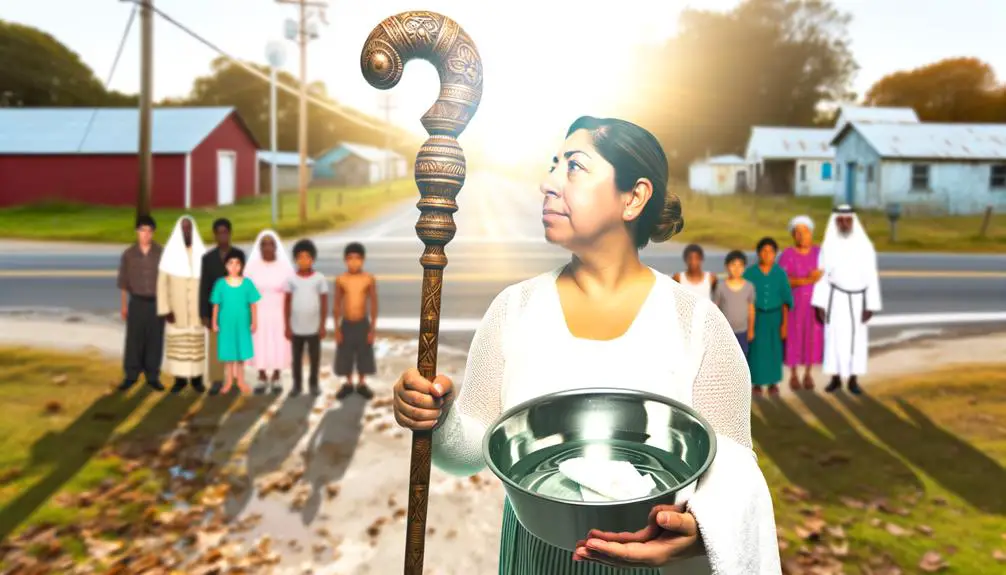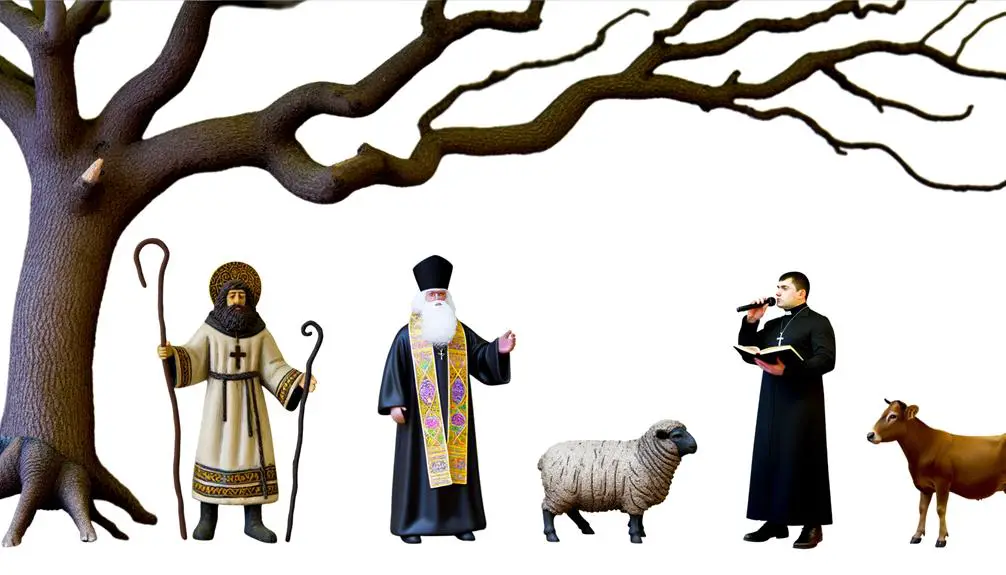Know the evolving role of pastors from biblical times to today's challenges, and discover their enduring impact on spiritual guidance.

Pastor in the Bible
Just as a shepherd guides their flock through rugged terrains, the biblical notion of a pastor embodies a journey of leadership and service. You're about to explore how this ancient role has evolved, from its scriptural roots to the multifaceted challenges it faces today.
The Apostle Paul's letters offer a window into the expectations and responsibilities of pastors, framing them as pivotal to the spiritual health of their communities. Yet, the path of a pastor is not without its trials.
Uncover how these figures navigate their dual roles and what we can learn from their resilience and adaptability in facing contemporary challenges.
Key Takeaways
- Biblical pastoral ministry is rooted in shepherd imagery, symbolizing guidance and care for the community.
- Pastoral duties in the Bible encompass teaching, spiritual guidance, community care, and leadership.
- Pastors are called to exemplify servant leadership, prioritizing the needs of their congregation with humility and compassion.
- The pastoral role has evolved to meet changing community needs while maintaining its foundational biblical principles.
Biblical Origins of Pastoral Ministry

The concept of pastoral ministry finds its roots in numerous passages throughout the Bible, where leaders are depicted as shepherds guiding their flocks. This imagery not only serves as a metaphor but also establishes a foundational paradigm for understanding the roles and responsibilities of pastors. In analyzing the biblical origins of pastoral ministry, it's essential to consider the priestly parallels and historical contexts that contribute to the development of this concept.
Priestly parallels are significant because they highlight the multifaceted role of pastors. In the Old Testament, priests acted as intermediaries between God and the people, offering sacrifices and teaching the Law. Similarly, pastors are called to mediate God's word to their congregations, embodying a form of spiritual leadership that mirrors the priestly function. This parallel underscores the continuity within the biblical narrative of God's leaders serving as connectors between the divine and the earthly realms.
Historical contexts further enrich our understanding of pastoral ministry. The pastoral role evolved over time, influenced by cultural, societal, and theological shifts within the early Christian communities and beyond. Initially, leadership roles were more fluid, but as the church's structure became more defined, so too did the expectations and responsibilities of pastors. This historical development reveals how pastoral ministry adapted to meet the needs of the faithful while remaining anchored in biblical precedents.
Pastors as Shepherds: A Scriptural Metaphor

Reflecting on the biblical origins of pastoral ministry, it's evident that pastors as shepherds stand as a central scriptural metaphor, deeply embedded within both Old and New Testament narratives. This metaphor is not merely decorative but serves a profound purpose in illustrating the roles and responsibilities inherent in spiritual leadership. Shepherd symbolism is rich with implications for flock management, guiding, protecting, and nurturing the community of believers.
The table below outlines key aspects of this metaphor as found in scripture:
Aspect |
Significance |
|---|---|
Guidance |
Just as shepherds guide their sheep to pastures, pastors are called to guide their congregations through spiritual and moral landscapes. |
Protection |
Shepherds protect their flock from predators. Similarly, pastors shield their congregation from spiritual threats and false teachings. |
Nurturance |
Providing for the flock's needs is a shepherd's duty, paralleling a pastor's role in nurturing the spiritual growth of their community. |
These elements highlight the depth of the shepherd-pastor metaphor, emphasizing the active, engaged nature of pastoral work. Shepherd symbolism encapsulates the essence of pastoral care, emphasizing the proactive, involved approach required in effective flock management. This metaphor not only provides a model for pastoral duties but also sets a standard for the character and commitment expected of spiritual leaders.
Analyzing this metaphorical framework reveals the nuanced expectations placed upon pastors. They're not merely administrators or facilitators but caretakers deeply invested in the well-being and spiritual health of their charges. The shepherd metaphor, therefore, is not just a poetic device but a foundational principle that shapes the pastoral vocation.
The Role of a Pastor According to Paul

In examining Paul's letters, you'll find that he clearly articulates the role of a pastor within the early Christian communities. He emphasizes pastoral duties, outlining tasks that range from teaching to offering spiritual guidance, and underscores the need for spiritual leadership qualities such as integrity and compassion.
This framework not only served as a foundation for early church leadership but continues to influence contemporary pastoral roles.
Pastoral Duties Outlined
Paul's epistles provide a detailed framework for pastoral duties, emphasizing the importance of teaching, guidance, and care within the church community. You'll find that congregational care and teaching responsibilities are pivotal. Paul advocates for pastors to be deeply involved in the lives of their congregation, offering support, counsel, and spiritual guidance. This care extends beyond mere oversight; it encompasses a heartfelt commitment to the well-being and growth of each individual.
Teaching responsibilities are equally critical. Paul underscores the need for pastors to impart doctrinal truth and moral guidance, ensuring that the community remains rooted in the foundational beliefs of the faith. This dual role of caring and teaching positions pastors as key facilitators of spiritual health and community cohesion, according to Paul's vision.
Spiritual Leadership Qualities
Building on the outlined pastoral duties, it's crucial to explore the spiritual leadership qualities that Paul deems essential for pastors. These qualities not only define the pastoral role but significantly influence the effectiveness of their ministry. Analyzing Paul's teachings, you'll see a clear emphasis on:
- Ethical decision-making: Pastors must navigate complex moral landscapes with integrity.
- Conflict resolution: They should skillfully mediate disputes within the community, fostering unity and peace.
- Compassion and empathy: Understanding and addressing the needs of their flock.
- Commitment to teaching: Diligently imparting wisdom and guiding spiritual growth.
These qualities underscore the multifaceted role of a pastor, emphasizing not just the administrative or ceremonial duties but the profound responsibility of shepherding a community with wisdom, care, and moral clarity.
Leadership and Service: A Pastor's Dual Role

You must recognize the intricate balance a pastor maintains between leadership and servitude within their community. Guiding spiritual journeys demands a deep understanding of the diverse paths individuals may follow, requiring a pastor to lead with empathy and insight.
Simultaneously, embodying servant leadership places them in a position of humility, advocating for the needs and growth of their congregation above their own ambitions.
Guiding Spiritual Journeys
Often, pastors play a pivotal role in guiding their congregations through spiritual journeys, balancing leadership responsibilities with acts of service. This dynamic process involves:
- Facilitating personal growth by encouraging members to deepen their faith and understanding.
- Fostering community building through shared experiences and mutual support.
- Leading by example, demonstrating the values and behaviors expected within the community.
- Providing pastoral care and counseling to address individual needs and challenges.
In executing these responsibilities, pastors not only lead but also serve their congregations, embodying a holistic approach that supports both the individual's and the community's spiritual development. This dual role underscores the importance of pastors in nurturing environments conducive to personal and communal transformation.
Embodying Servant Leadership
How do pastors embody servant leadership while simultaneously fulfilling their roles as leaders within their communities?
This dual role is central to a pastor's effectiveness and hinges on the integration of modern applications of ancient principles. Leadership styles in pastoral contexts often reflect the servant model, prioritizing the needs and growth of the congregation over the leader's personal ambitions.
This approach, deeply rooted in biblical teachings, challenges pastors to lead by example, demonstrating humility, compassion, and a willingness to serve rather than be served. Through this lens, the pastoral role transforms from one of authority to one of service, aligning with contemporary expectations of leadership that value empathy, active listening, and the empowerment of others.
These modern applications of servant leadership underscore its timeless relevance and adaptability.
Challenges Faced by Biblical Pastors

Biblical pastors encountered numerous challenges, including persecution, false teachings, and the daunting task of guiding early Christian communities amidst external and internal conflicts. Navigating through diverse cultural contexts, they had to communicate the gospel in a way that was relevant and understandable to different groups. Moreover, financial stewardship posed a significant challenge, as ensuring the sustainability of the ministry without compromising its integrity was crucial.
To paint a picture for the audience:
- Persecution: They often faced threats to their lives, with authorities and even communities opposing their teachings. This external pressure tested their faith and commitment.
- False Teachings: The spread of misleading doctrines threatened to divide or corrupt the early church, requiring pastors to be vigilant and knowledgeable to protect their flock.
- Cultural Contexts: Adapting the message of the gospel to various cultures without altering its core truth demanded wisdom and sensitivity.
- Financial Stewardship: Managing resources effectively, especially in times of scarcity, was essential for the survival and growth of early Christian communities.
These challenges required biblical pastors to be deeply rooted in their faith, wise in their decisions, and adaptable in their methods. As they navigated through these obstacles, their ultimate goal remained clear: to shepherd the flock entrusted to them, guiding them towards spiritual growth and unity in Christ. Their legacy of resilience and dedication continues to inspire leaders in the faith community today.
The Evolution of Pastoral Ministry

Over centuries, the role of pastoral ministry has undergone significant transformations, adapting to societal shifts and theological developments. Initially, pastors served as spiritual guides within early Christian communities, focusing primarily on preaching, teaching, and spiritual care. However, as Christianity spread and societies evolved, the need for cultural adaptation and leadership evolution became apparent.
You'll notice that, in response to the changing needs of congregations, pastoral ministry expanded its functions. Pastors began to engage more deeply in community life, addressing social issues and advocating for justice. This shift marked a significant evolution from a solely spiritual role to a more integrated leadership position within society.
Furthermore, the concept of pastoral ministry has been influenced by theological developments. The Reformation, for example, emphasized the priesthood of all believers, which democratized the role of the pastor, shifting it from an exclusive spiritual authority to a more accessible and relatable leadership model.
In modern times, pastoral ministry continues to evolve. Pastors now navigate the complexities of a digital age, where cultural adaptation involves engaging with congregations both online and offline. Leadership evolution in pastoral ministry now includes technological savvy, alongside traditional pastoral care.
This constant evolution reflects the pastoral ministry's resilience and its ability to adapt to changing cultural and societal landscapes. The role of the pastor, therefore, isn't static but is an ever-adapting response to the needs of the congregation and the wider community, ensuring that the leadership provided is relevant, empathetic, and effective in guiding spiritual growth and social engagement.
Frequently Asked Questions
How Do Contemporary Pastoral Duties Compare With Those of Pastors in the Bible, Considering Technological Advancements and Modern Societal Structures?
Today's pastoral duties have expanded due to technological advancements and changes in societal structures. You're now navigating digital evangelism and social media outreach, roles that pastors in biblical times didn't face.
While the core spiritual and community leadership functions remain, you're adapting to reach congregations online and engage with wider communities through digital platforms. This evolution reflects an adaptation to modern communication methods while striving to maintain the essence of pastoral care.
What Are Some of the Most Notable Differences in the Pastoral Role Between Various Christian Denominations as Influenced by Their Interpretation of the Bible?
You'll find that the shepherd's cloak is woven differently across the Christian tapestry.
Clerical celibacy, for instance, marks a profound divide; it's embraced by some, while others walk a different path, marrying and raising families.
Liturgical uniforms, too, range from the simple to the splendid, reflecting a denomination's reading of sacred texts.
These variances underscore how interpretation of the Bible shapes the pastoral role, illustrating a rich mosaic of belief and practice.
How Has the Concept of Pastoral Accountability Evolved From Biblical Times to the Present, Especially Regarding Ethical and Moral Responsibilities?
You're exploring how pastoral accountability has evolved, focusing on ethical and moral responsibilities.
Initially, shepherd imagery in the Bible symbolized guidance and care, setting a foundation for accountability.
Over time, accountability mechanisms have diversified across denominations, incorporating both traditional biblical interpretations and modern ethical standards.
This evolution reflects a deepening understanding of pastoral roles, emphasizing not just spiritual guidance but also ethical leadership and moral responsibility in contemporary contexts.
In What Ways Have Biblical Examples of Pastoral Leadership Influenced Secular Leadership Theories and Practices Today?
You're exploring how leadership styles in secular realms reflect biblical teachings, even without direct reference to pastoral examples. Analyzing this, you'll see cultural influences shape leadership theories, yet principles of integrity, service, and accountability, often mirrored in biblical narratives, pervade modern practices.
This crossover suggests that foundational aspects of leadership transcend religious contexts, influencing secular leadership theories and practices today with enduring ethical and moral dimensions.
How Do Modern Pastoral Training Programs Incorporate the Principles of Pastoral Ministry Outlined in the Bible, Given the Diverse Challenges of the 21st Century?
Today's pastoral training programs skillfully blend ancient wisdom with modern challenges. You'll find cultural adaptation at the core, ensuring teachings resonate across diverse societies.
Moreover, digital evangelism is emphasized, acknowledging our era's technological landscape. These programs don't just echo biblical principles; they reinterpret them for the 21st century, addressing issues like globalization and inclusivity head-on.
It's a thoughtful, dynamic approach to ministry, rooted in tradition but agile enough to navigate today's complexities.
Conclusion
In conclusion, you've journeyed through the pastoral ministry's biblical roots, uncovering its essence as shepherds guiding their flock. Paul's writings illuminated a pastor's multifaceted role, balancing leadership with service amidst challenges.
Like a tree evolving through seasons, pastoral ministry has grown, adapting to nourish spiritual life. This evolution reflects a profound understanding of pastoral care, symbolizing a beacon of hope and guidance in the spiritual wilderness, continually reshaping to meet the flock's ever-changing needs.



Sign up